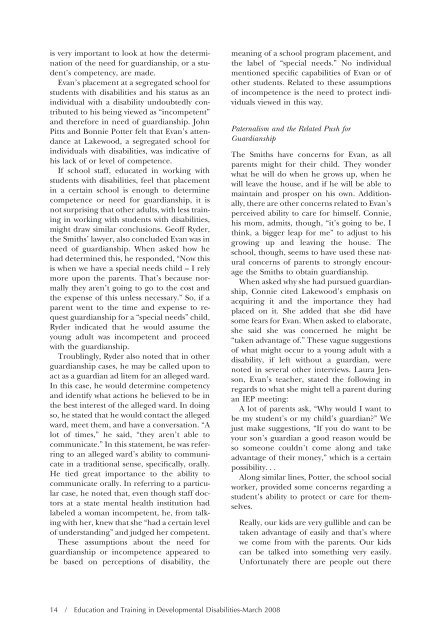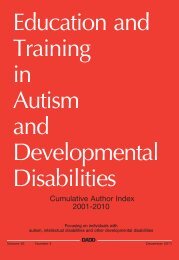Download the Journal (PDF) - Division on Autism and ...
Download the Journal (PDF) - Division on Autism and ...
Download the Journal (PDF) - Division on Autism and ...
You also want an ePaper? Increase the reach of your titles
YUMPU automatically turns print PDFs into web optimized ePapers that Google loves.
is very important to look at how <str<strong>on</strong>g>the</str<strong>on</strong>g> determinati<strong>on</strong><br />
of <str<strong>on</strong>g>the</str<strong>on</strong>g> need for guardianship, or a student’s<br />
competency, are made.<br />
Evan’s placement at a segregated school for<br />
students with disabilities <strong>and</strong> his status as an<br />
individual with a disability undoubtedly c<strong>on</strong>tributed<br />
to his being viewed as “incompetent”<br />
<strong>and</strong> <str<strong>on</strong>g>the</str<strong>on</strong>g>refore in need of guardianship. John<br />
Pitts <strong>and</strong> B<strong>on</strong>nie Potter felt that Evan’s attendance<br />
at Lakewood, a segregated school for<br />
individuals with disabilities, was indicative of<br />
his lack of or level of competence.<br />
If school staff, educated in working with<br />
students with disabilities, feel that placement<br />
in a certain school is enough to determine<br />
competence or need for guardianship, it is<br />
not surprising that o<str<strong>on</strong>g>the</str<strong>on</strong>g>r adults, with less training<br />
in working with students with disabilities,<br />
might draw similar c<strong>on</strong>clusi<strong>on</strong>s. Geoff Ryder,<br />
<str<strong>on</strong>g>the</str<strong>on</strong>g> Smiths’ lawyer, also c<strong>on</strong>cluded Evan was in<br />
need of guardianship. When asked how he<br />
had determined this, he resp<strong>on</strong>ded, “Now this<br />
is when we have a special needs child – I rely<br />
more up<strong>on</strong> <str<strong>on</strong>g>the</str<strong>on</strong>g> parents. That’s because normally<br />
<str<strong>on</strong>g>the</str<strong>on</strong>g>y aren’t going to go to <str<strong>on</strong>g>the</str<strong>on</strong>g> cost <strong>and</strong><br />
<str<strong>on</strong>g>the</str<strong>on</strong>g> expense of this unless necessary.” So, if a<br />
parent went to <str<strong>on</strong>g>the</str<strong>on</strong>g> time <strong>and</strong> expense to request<br />
guardianship for a “special needs” child,<br />
Ryder indicated that he would assume <str<strong>on</strong>g>the</str<strong>on</strong>g><br />
young adult was incompetent <strong>and</strong> proceed<br />
with <str<strong>on</strong>g>the</str<strong>on</strong>g> guardianship.<br />
Troublingly, Ryder also noted that in o<str<strong>on</strong>g>the</str<strong>on</strong>g>r<br />
guardianship cases, he may be called up<strong>on</strong> to<br />
act as a guardian ad litem for an alleged ward.<br />
In this case, he would determine competency<br />
<strong>and</strong> identify what acti<strong>on</strong>s he believed to be in<br />
<str<strong>on</strong>g>the</str<strong>on</strong>g> best interest of <str<strong>on</strong>g>the</str<strong>on</strong>g> alleged ward. In doing<br />
so, he stated that he would c<strong>on</strong>tact <str<strong>on</strong>g>the</str<strong>on</strong>g> alleged<br />
ward, meet <str<strong>on</strong>g>the</str<strong>on</strong>g>m, <strong>and</strong> have a c<strong>on</strong>versati<strong>on</strong>. “A<br />
lot of times,” he said, “<str<strong>on</strong>g>the</str<strong>on</strong>g>y aren’t able to<br />
communicate.” In this statement, he was referring<br />
to an alleged ward’s ability to communicate<br />
in a traditi<strong>on</strong>al sense, specifically, orally.<br />
He tied great importance to <str<strong>on</strong>g>the</str<strong>on</strong>g> ability to<br />
communicate orally. In referring to a particular<br />
case, he noted that, even though staff doctors<br />
at a state mental health instituti<strong>on</strong> had<br />
labeled a woman incompetent, he, from talking<br />
with her, knew that she “had a certain level<br />
of underst<strong>and</strong>ing” <strong>and</strong> judged her competent.<br />
These assumpti<strong>on</strong>s about <str<strong>on</strong>g>the</str<strong>on</strong>g> need for<br />
guardianship or incompetence appeared to<br />
be based <strong>on</strong> percepti<strong>on</strong>s of disability, <str<strong>on</strong>g>the</str<strong>on</strong>g><br />
14 / Educati<strong>on</strong> <strong>and</strong> Training in Developmental Disabilities-March 2008<br />
meaning of a school program placement, <strong>and</strong><br />
<str<strong>on</strong>g>the</str<strong>on</strong>g> label of “special needs.” No individual<br />
menti<strong>on</strong>ed specific capabilities of Evan or of<br />
o<str<strong>on</strong>g>the</str<strong>on</strong>g>r students. Related to <str<strong>on</strong>g>the</str<strong>on</strong>g>se assumpti<strong>on</strong>s<br />
of incompetence is <str<strong>on</strong>g>the</str<strong>on</strong>g> need to protect individuals<br />
viewed in this way.<br />
Paternalism <strong>and</strong> <str<strong>on</strong>g>the</str<strong>on</strong>g> Related Push for<br />
Guardianship<br />
The Smiths have c<strong>on</strong>cerns for Evan, as all<br />
parents might for <str<strong>on</strong>g>the</str<strong>on</strong>g>ir child. They w<strong>on</strong>der<br />
what he will do when he grows up, when he<br />
will leave <str<strong>on</strong>g>the</str<strong>on</strong>g> house, <strong>and</strong> if he will be able to<br />
maintain <strong>and</strong> prosper <strong>on</strong> his own. Additi<strong>on</strong>ally,<br />
<str<strong>on</strong>g>the</str<strong>on</strong>g>re are o<str<strong>on</strong>g>the</str<strong>on</strong>g>r c<strong>on</strong>cerns related to Evan’s<br />
perceived ability to care for himself. C<strong>on</strong>nie,<br />
his mom, admits, though, “it’s going to be, I<br />
think, a bigger leap for me” to adjust to his<br />
growing up <strong>and</strong> leaving <str<strong>on</strong>g>the</str<strong>on</strong>g> house. The<br />
school, though, seems to have used <str<strong>on</strong>g>the</str<strong>on</strong>g>se natural<br />
c<strong>on</strong>cerns of parents to str<strong>on</strong>gly encourage<br />
<str<strong>on</strong>g>the</str<strong>on</strong>g> Smiths to obtain guardianship.<br />
When asked why she had pursued guardianship,<br />
C<strong>on</strong>nie cited Lakewood’s emphasis <strong>on</strong><br />
acquiring it <strong>and</strong> <str<strong>on</strong>g>the</str<strong>on</strong>g> importance <str<strong>on</strong>g>the</str<strong>on</strong>g>y had<br />
placed <strong>on</strong> it. She added that she did have<br />
some fears for Evan. When asked to elaborate,<br />
she said she was c<strong>on</strong>cerned he might be<br />
“taken advantage of.” These vague suggesti<strong>on</strong>s<br />
of what might occur to a young adult with a<br />
disability, if left without a guardian, were<br />
noted in several o<str<strong>on</strong>g>the</str<strong>on</strong>g>r interviews. Laura Jens<strong>on</strong>,<br />
Evan’s teacher, stated <str<strong>on</strong>g>the</str<strong>on</strong>g> following in<br />
regards to what she might tell a parent during<br />
an IEP meeting:<br />
A lot of parents ask, “Why would I want to<br />
be my student’s or my child’s guardian?” We<br />
just make suggesti<strong>on</strong>s, “If you do want to be<br />
your s<strong>on</strong>’s guardian a good reas<strong>on</strong> would be<br />
so some<strong>on</strong>e couldn’t come al<strong>on</strong>g <strong>and</strong> take<br />
advantage of <str<strong>on</strong>g>the</str<strong>on</strong>g>ir m<strong>on</strong>ey,” which is a certain<br />
possibility. . .<br />
Al<strong>on</strong>g similar lines, Potter, <str<strong>on</strong>g>the</str<strong>on</strong>g> school social<br />
worker, provided some c<strong>on</strong>cerns regarding a<br />
student’s ability to protect or care for <str<strong>on</strong>g>the</str<strong>on</strong>g>mselves.<br />
Really, our kids are very gullible <strong>and</strong> can be<br />
taken advantage of easily <strong>and</strong> that’s where<br />
we come from with <str<strong>on</strong>g>the</str<strong>on</strong>g> parents. Our kids<br />
can be talked into something very easily.<br />
Unfortunately <str<strong>on</strong>g>the</str<strong>on</strong>g>re are people out <str<strong>on</strong>g>the</str<strong>on</strong>g>re
















